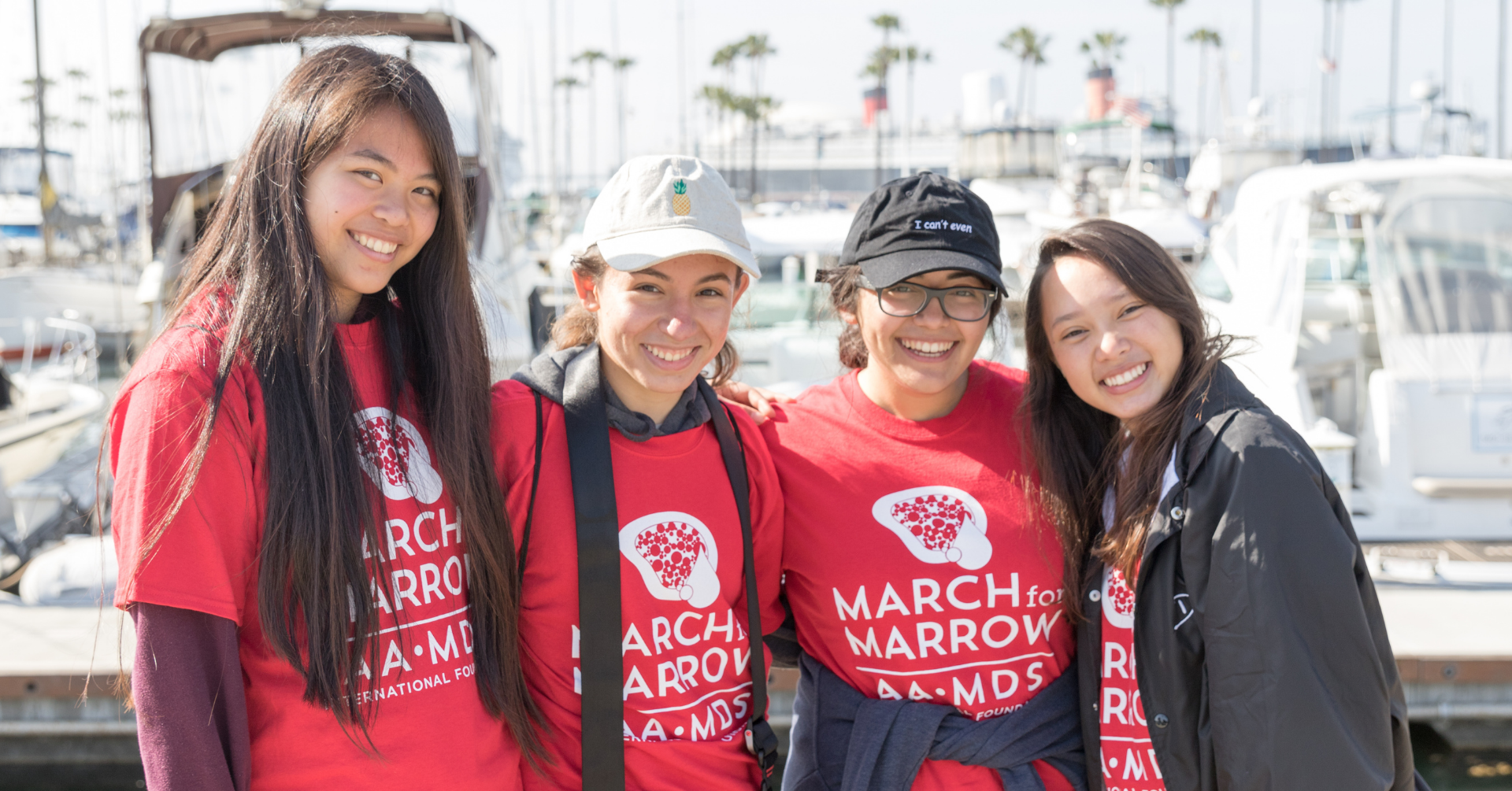Fourteen student survivors of bone marrow failure bone marrow failure: A condition that occurs when the bone marrow stops making enough healthy blood cells. The most common of these rare diseases are aplastic anemia, myelodysplastic syndromes (MDS) and paroxysmal nocturnal hemoglobinuria (PNH). Bone marrow failure can be acquired (begin any time in life) or can be… diseases have been awarded Matthew Debono Memorial Scholarships for the 2015-2016 school year. The scholarships, which range from $1,000 to $2,000, are awarded annually and are funded by the family and friends of Matthew Debono, who died in 1986 from aplastic anemia aplastic anemia: (ay-PLASS-tik uh-NEE_mee-uh) A rare and serious condition in which the bone marrow fails to make enough blood cells - red blood cells, white blood cells, and platelets. The term aplastic is a Greek word meaning not to form. Anemia is a condition that happens when red blood cell count is low. Most… .
$21,000 was awarded to recipients hailing from 12 states. Many of the recipients plan to work in the medical field, studying to be physicians, nurses, and medical technologists. They have been inspired by their personal experiences battling these diseases. Like Matthew Debono, most have fought or are still fighting aplastic anemia. Others have also been affected by PNH and MDS. They have survived difficult treatments for their disease and through their own determination and hard work have positioned themselves to attend college and follow their dreams.
Read more about the Matthew Debono Memorial Scholarship Fund.
2015 Recipients
Danielle Anshus
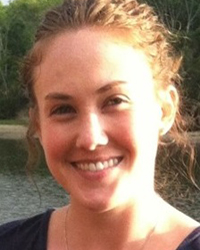
When Danielle was in the Mayo Clinic’s Saint Mary’s Hospital in Minnesota awaiting a
bone marrow transplant
bone marrow transplant:
A bone marrow transplant (BMT) is also called a stem cell transplant (SCT) or hematopoietic stem cell transplant (HSCT).The procedure replaces unhealthy blood-forming stem cells with healthy ones and offers some patients the possibility of a cure. But for many patients, a BMT is not an option due…
from her sister in July 2010, the then 19-year-old was scared and nervous. Humor was her outlet. Once she received a meal and was upset the beans she had ordered did not arrive. Proclaiming “They forgot my beans!” made her and her family members break out laughing in what was a much needed moment of comic relief. Humor was only one of the traits that got Danielle through her aplastic anemia experience. She says the perseverance she learned running track in high school, her positivity, her support network, and the trust she had in God and for the professionals treating her, also pulled her through her ordeal.
Danielle was diagnosed the summer after completing her freshman year at the University of Wisconsin – Lacrosse. After her transplant, she missed a semester of school, but through hard work, was able to graduate in the spring of 2013 as planned graduating with honors. Now, the first-time Debono scholar is finishing her first year in graduate school at UW-Lacrosse pursuing a career in occupational therapy. Her new lease on life prompted an even greater desire to give back to others. She says as an occupational therapist she is able to help patients regain their sense of independence and improve their quality of life. The greatest gift she says from her aplastic anemia journey is the ability to relate to others going through challenging circumstances. For four years, she has participated in the American Cancer Society’s Relay for Life event as a team captain. Danielle also traveled with her church to a Native American reservation in Montana to tutor elementary students at an academy, and shared her journey as the keynote speaker to Mayo Clinic employees at a conference to show her gratitude for their care. The Rochester, Minnesota native also provided support to a teenage girl with aplastic anemia, visiting her in the hospital and paying forward the support she received.
In Her Own Words
Now being on the other side of the illness, I realize what a treasured gift life is. I try to appreciate life to its fullest each day by giving back to others. My new mantra is one from Albert Einstein as he said, “Only a life lived for others is a life worthwhile." I grew a lot emotionally and spiritually throughout my aplastic anemia journey and, with the belief that everything happens for a reason, I use those character traits that helped me through my journey to help others. I love meeting new people and spending time with friends, assuring them that they will always have a lasting, supportive friend in me. I strive to be someone that others can trust in sharing their celebrations or frustrations. And when enduring a challenging time, I provide a humorous perspective because, as I experienced, sometimes you need a laugh of comic relief. As life itself can be challenging on occasion, I am a cheerleader for others and encourage others to persevere. It is all too easy to see how any situation can go wrong; however, I try to instill a sense of positivity and optimism. I know the challenges in any day can be tackled with hard work and determination because I have endured a much harder feat. Because I was faced with a life-threatening illness, I was given a valuable opportunity to gain a new life perspective that I will always cherish and be thankful for.
Kristen Cavalleri
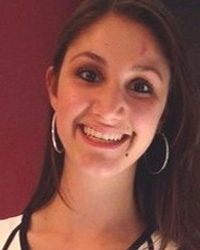
One of Kristen’s communications professors describes the now three-time Debono scholarship recipient as “bright, ambitious, thoughtful, and hard working.” Kristen, who hails from North Tonawanda, New York, will be entering her senior year this fall at Niagara University majoring in Communications. When she first began her college career, she was more interested in broadcast journalism, but has now discovered that her real passions lay in advertising and public relations. This is thanks in part to an internship she garnered with a local agency. What started as a summer internship, has continued into the fall and spring semesters. While gaining valuable experience, she also receives college credits. Kristen is an excellent student maintaining a 3.6 GPA. She has been inducted into the communication department’s honor society, something for which fewer than 25% of those with her major qualify. She also continues to work at a supermarket as she’s done for all four years to earn money for school.
Kristen was diagnosed with aplastic anemia when she was three years old in 1997. Her parents were told she had less than a five percent of survival. In a final effort, the doctors started her on a
clinical trial
clinical trial:
A type of research study that tests how a drug, medical device, or treatment approach works in people. There are several types of clinical trials. Treatment trials test new treatment options. Diagnostic trials test new ways to diagnose a disease. Screening trials test the best way to detect a…
medication, which after three months, brought her blood counts up to normal levels. Her mother was pregnant with her brother at the time. Her parents had a difficult decision trying to determine if they should wait for the baby to be born and use the
stem cells
stem cells:
Cells in the body that develop into other cells. There are two main sources of stem cells. Embryonic stem cells come from human embryos and are used in medical research. Adult stem cells in the body repair and maintain the organ or tissue in which they are found. Blood-forming (hemapoietic) stem…
from his umbilical cord blood for a bone marrow transplant, or if they should immediately go into the trial. They made the right decision, as her brother was not a match so he could not be her donor. Today, Kristen is healthy and appreciative of not only the opportunities she’s been given, but also the love and strength her parents showed throughout her ordeal. Kristen gives back to her community volunteering at her church and with an ambulance service. She has also used her public relations skills to raise money and awareness for a cancer institute in Buffalo.
In Her Own Words
As a child, it’s hard to understand a lot of things. Life, death, time, aging - many of the things adults have no problem understanding, children can’t even begin to comprehend. When you’re three and you could die, how do you comprehend this thought? You barely know what it means to live yet. That was the situation my family was faced with almost eighteen years ago. It’s hard to pinpoint what got me through my disease because I was so young when it affected me the most. However, throughout the rest of my life thus far, the experience has left an impression on me. I found that the optimism and endurance shown by my parents, even in the grimmest of circumstances, has influenced how I live my life every day. Life is unpredictable, and with the good comes the bad. I’ve learned that, especially after being ill, every day is a gift. You can’t take any part of your life for granted. With this comes making the most of every situation - trying to be optimistic and hopeful under all different types of circumstances. Along with optimism comes endurance. You have to be able to say things are going to get better, believe it, and move yourself forward. While I was very young when I was diagnosed with aplastic anemia, it is not something that I take lightly. It has changed my life for the better in many ways, because without it I wouldn’t be who I am today.
Kelly Eastman
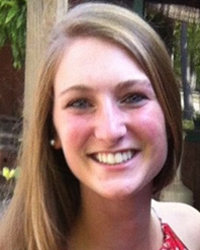
Kelly says that the traits that have helped her live through aplastic anemia are strength, optimism, and determination. The two-time Debono scholar has shown she possesses all of those qualities as this summer she will enter her third semester of the five required to obtain a nursing degree from the Goldfarb School of Nursing at Barnes-Jewish College in St. Louis. Her dream is to become a pediatric/oncology nurse and she hopes to one day work at Cardinal Glennon Children’s Hospital in St. Louis where she received a life-saving transplant from her sister in 2008 at the age of 14.
In order to get admitted into Goldfarb, Kelly had to take prerequisites for two years at McKendree College and Southwestern Illinois Community College. Between the three schools, she has compiled a 3.8 GPA. While going to school and sometimes struggling with low blood counts, she held down three part-time jobs and also played goaltender for her collegiate lacrosse team at McKendree. In 2013, she was named to the Academic All-Western Intercollegiate Lacrosse Association team, an honor reserved for academic and athletic achievement. Kelly says that when she becomes a nurse, she’ll be able to tell the children about “a girl who almost died and eventually played a college sport.”
In Her Own Words
Weakness is not an option for myself and never has been. I rely on my inner strength, physical strength, and my strength from God to get me through the tough times life throws my way. Throughout my ordeal, I relied on the “glass half full” approach as well as “don’t sweat the small stuff.” I even coined a phrase, “Today I will overlook the bad, see the good, and be the great!” Failure is not an option in my life nor my vocabulary. What sets me apart from others? They are not Kelly Eastman. I am a very unique individual who chooses to be full of life and embrace laughter at every turn. I participate in being a counselor for Camp Rainbow (a camp for kids with cancer and life-threatening blood disorders) each summer for the past five years. It brings me no greater joy then providing them a week away from their medical issues and letting them be just normal kids at a summer camp. During both high school and college, I played women’s lacrosse and was able to gain valuable leadership qualities by being the goalie, the quarterback on the field. This quality will prove invaluable while making decisions in a high pressure situation on the nursing floor I will work on.
Thomas Howlett
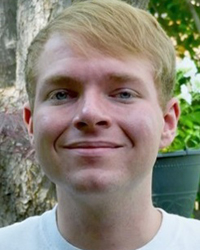
In March 2011, the 18-year old from Plano, Texas was diagnosed with MDS which quickly evolved into
acute myeloid leukemia
acute myeloid leukemia:
(uh-KYOOT my-uh-LOYD loo-KEE-mee-uh) A cancer of the blood cells. It happens when very young white blood cells (blasts) in the bone marrow fail to mature. The blast cells stay in the bone marrow and become to numerous. This slows production of red blood cells and platelets. Some cases of MDS become…
. As an only child, he urgently needed to find an unrelated bone-marrow donor. His miracle came in the form of a 24-year-old female from Minnesota who saved his life. However, after the transplant, this excellent student had secondary problems that slowed him down, but didn’t stop him. Thomas has had to be patient. When he was diagnosed, he was 14 years old and a freshman in high school. He was hospitalized for five months and home for three semesters, having to self-study his coursework. He had pain in his knees and in his senior year, had two knee surgeries. Despite these obstacles, he achieved a 3.9 GPA in high school and played marimba and bassoon for the marching band.
Today the sophomore-to-be walks around his University of Texas-Dallas campus free of pain, although he continues to have some pulmonary difficulties. “Health wise, I am doing the best I have in years,” he says. This is his second consecutive Debono scholarship. A biochemistry major, he would like to go into the medical research field and develop new drugs and treatments for rare blood diseases and cancer. Thomas recently earned the rank of Eagle Scout, finishing a project creating care packages for children hospitalized with cancer at Medical City Dallas Hospital, the same hospital he was treated in for five months. Thomas says college has helped him become more socially outgoing and get out of his comfort zone. This fall, Thomas has obtained an internship with the Gift of Life
Bone Marrow
Bone Marrow:
The soft, spongy tissue inside most bones. Blood cells are formed in the bone marrow.
Foundation in a position where he would be responsible for planning and organizing bone marrow drives at his college and others in the area. In June, Thomas was able to meet his bone marrow donor for the first time.
In His Own Words
Patience was by far one of the most important skills that helped me get through my journey, whether it was waiting for test results, waiting for my body to recover, or even waiting for a chance to leave the hospital. Perseverance and diligence, along with will power, were also crucial to me and helped by enabling me to push through and fight my disease. Going in, my faith was also a characteristic that helped me overcome my disease. It was able to help keep me calm and accepting of everything that was happening. The traits and lessons I developed and learned from my journey are probably what sets me apart from others the most. The experiences have helped me develop as a person and have given me an understanding of life different from most people my age.
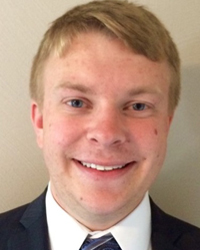
When Joseph started to consider his career path, at first, it was all about music. He attended college at Slippery Rock University in Pennsylvania with the ultimate goal of becoming a professional musician and music educator. He participated in marching band at Slippery Rock for all four years he attended. In his last two years, he served as Drum Major, acting as the liaison between the members of the band and band director. While a college student, he also worked as Assistant Band Director for his high school marching band as a way to earn money and remain active in his hometown of Pittsburgh. Joseph graduated with his degree in Music Education with a strong 3.7 GPA.
During his summers as an undergraduate, he worked as a legislative assistant for his area’s state senator and started to develop new interests. His work as an assistant provided him with the opportunity to “assist those in need, and to make sure any issue they faced was handled with the utmost care and importance,” says Joseph. While he still loved music, he developed a strong interest in the law. This fall, the 23-year-old aplastic anemia survivor will begin his second year of law school at Duquesne University in Pittsburgh. Joseph says he hopes to be in a position one day to assist those who’ve been affected by health and medical issues and ensure that they receive fair treatment. Joseph was diagnosed with aplastic anemia at the age of seven after his mother noticed extensive bruising all over his body. Treated primarily with ATG (anti-thymocyte globulin)
immunosuppressive therapy
immunosuppressive therapy:
Immunosuppressive drug therapy lowers your body's immune response. This prevents your immune system from attacking your bone marrow, allowing bone marrow stem cells to grow, which raises blood counts.
For older patients with acquired aplastic anemia, immunosuppressive drug therapy is the…
, he has now been in full remission for over 10 years. While he doesn’t remember the fine details of his treatment, he does remember the care received from the staff at Children’s Hospital of Pittsburgh and the support of his family.
In His Own Words
The biggest high point I recall was being told that I would get to make a wish through the Make-A-Wish Foundation. I wished that my family and I would go to Disney World, and off we went. Another great memory I have is of one of my birthdays. I was able to be at my home for it, but had to wear a mask when outdoors. As a young child, I was embarrassed by this, but in a tremendous showing of support, all of my family members wore masks with me. The support they showed throughout my journey will always stand out. Finally, the moment when the doctor told us that they had found evidence that my bone marrow was producing new cells was incredible. I have never seen such a celebration. Any good news after a visit to the clinic was followed by a pizza party. My experience with severe aplastic anemia was a very scary time. However, with any difficult time, there comes the opportunity to develop as a person. Now as a young adult reflecting on that time, I realize that I developed mentally, emotionally, and spiritually. I learned that life is precious and nothing should ever be taken for granted. My advice to those currently fighting a bone marrow disease, as well as their family, friends, and community, is to never give up. Times will be difficult, and the outlook may look uncertain, but find strength through each other, trust the doctors, and trust in God, and everything will be alright.
Carolyn Kesterman
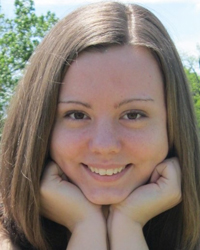
When Carolyn was told in May 2014 that she had PNH, she actually smiled at hearing the diagnosis. She was relieved that she had a disease that could be treated with a medication,
eculizumab
eculizumab:
Eculizumab (Soliris ®) is given as an IV into a vein at the doctor’s office or at a special center. The procedure usually takes about 35 minutes. You will probably get an IV once a week for the first 4 weeks. Starting in the 5th week, you will get a slightly higher dose of Soliris every 2 weeks.
…
(Soliris®). She says, “I now knew I that I was strong.” For several months, she had been struggling with fatigue and had difficulty breathing. As a principal ballet dancer with the traveling Cincinnati Kinderballet for six years, she suddenly had difficulty during rehearsals and performances. She became self-critical and faced pressure and judgement from others. She chalked her fatigue up to stress. Carolyn was also a senior in high school who wanted to maintain her A average and she was having difficulty concentrating. Carolyn finally asked her father to make a doctor’s appointment when she nearly collapsed while biking in gym class. Her diagnosis validated that her struggles were beyond her control.
While Carolyn has to accommodate her medical treatment while going to school, the first-time Debono scholar is doing well. This fall, Carolyn will begin her sophomore year in college at Mt. St. Joseph University in her hometown of Cincinnati. During the first semester of college, she achieved a 4.0 GPA. This was a continuation of her high school accomplishments which included receiving the President’s Award for Educational Excellence in 2014 and membership in the National Honor and French Honor Societies. What Carolyn is most proud of is her writing ability. She is majoring in English and Creative Writing and is pursuing a writing career. She says one of her happiest moments is when she received the highest award in her high school for excelling in English. The 19 year-old also was one of the winners of the Sister Helen Prejean Writing Contest and was given the honor to read her piece before a speech by Ms. Prejean, a minister portrayed in the movie “Dead Man Walking”.
In Her Own Words
All my life, I have been imaginative and creative. As a child, I made up stories about my toys and shared them with my family and friends, finding that I loved to have impact on people through this talent. In the fourth grade, my teacher gave us an assignment where we had to use the spelling words of the week in a story. After doing this, I fell in love with writing and the idea of pursuing it. Between then and now, I have written countless short stories in my free time, as well as a young adult fantasy series that I hope will be published someday. When I imagine my future, there isn’t a version of it where I am not a writer. I feel strongly that this is my calling in life and I am willing to take the undoubtedly difficult path that fulfilling this dream will require. There are many other professions that I am capable of that could be easier and more profitable than being a writer, but I feel that I have messages that the world should hear. I hope that someday soon, I will be able to positively impact lives through my stories and feel on a larger scale that joy that I felt as a child.
Tim McCarthy
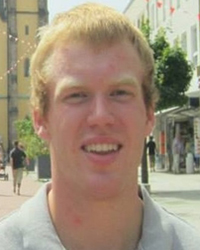 Although Tim is still in school, he is already an accomplished trumpeter. The 23-year-old from Brush Prairie, Washington is finishing the first year of his Master’s degree program in Trumpet Performance at Arizona State University. He has traveled throughout the United States and the world performing in China, Spain, France, Germany, and Italy traveling wherever he can gaining the experience that will lead him to his ultimate goal – a job with a professional orchestra. Tim is focused on his goals and extremely hard working. After graduating with his bachelor’s degree in Music Performance from St. Olaf College in 2014, Tim achieved a 4.0 GPA in the first semester of his Master’s program. He teaches trumpet at two schools and is now giving private lessons. He is a regular substitute with the Tucson Symphony Orchestra. This June, Tim has obtained a fellowship to the Colorado College Summer Music Festival.
Although Tim is still in school, he is already an accomplished trumpeter. The 23-year-old from Brush Prairie, Washington is finishing the first year of his Master’s degree program in Trumpet Performance at Arizona State University. He has traveled throughout the United States and the world performing in China, Spain, France, Germany, and Italy traveling wherever he can gaining the experience that will lead him to his ultimate goal – a job with a professional orchestra. Tim is focused on his goals and extremely hard working. After graduating with his bachelor’s degree in Music Performance from St. Olaf College in 2014, Tim achieved a 4.0 GPA in the first semester of his Master’s program. He teaches trumpet at two schools and is now giving private lessons. He is a regular substitute with the Tucson Symphony Orchestra. This June, Tim has obtained a fellowship to the Colorado College Summer Music Festival.Diagnosed with aplastic anemia in the seventh grade, Tim is receiving his third Matthew Debono Scholarship. Before undergoing a possible bone marrow transplant, Tim’s parents sent him to his grandparents in Colorado, hoping that a change to a high altitude environment would help his disease. After four extended trips to Colorado in one year, his blood counts gradually improved. Only recently has Tim achieved normal blood counts. Besides music, Tim is an avid fisherman and bow hunter. Last summer, after spending time in Europe playing with the St. Olaf Band, and touring four countries with friends, he flew directly to Alaska to work on a commercial fishing crew and later to do some recreational salmon fishing.
In His Own Words
Something that has become apparent to me in the past few years is that if you want something in your life to change, you have to make it happen. During the years that I was worried about my health, aplastic anemia was in charge. Even though I was sick, I made the most out of aspects of my life that weren’t affected by my health. I was able to practice trumpet regardless of my blood counts, and improved rapidly. But I was never as disciplined in my pursuits as I am now. Being stable for over four years, I have come to appreciate the increased control I have over my life. As a freshman at St. Olaf, I was not the best trumpet player at the school. I wanted to get better, so I practiced regularly for five hours a day, and I got better, becoming principal trumpet of the band and orchestra the following year. I wanted to get in better physical shape my junior year, so I found a workout plan and followed it five days a week. Rather than simply talk about making changes, I have made a point of following through in the most organized, disciplined way I can in order to achieve the best results. For the past two years, my focus has been on winning a professional orchestra job. The actual act of auditioning has always been my biggest struggle, so in order to improve my auditioning I have applied for every job I can. For auditions, as for anything, improvement requires practice. For me, that means practice not just in terms of learning the music, but practicing the act of auditioning. I am willing to do what it takes to achieve my goals.
Nicholas Pipitone
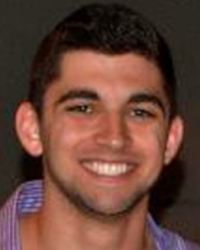
Nick says he may not “be the smartest individual”, but he will work harder than the smartest in the room. The Harrison, New York native, who just finished his sophomore year at the State University of New York – Albany, is pretty smart. Through his first two years, he has achieved a 3.84 GPA. This fall, the accounting major will be transferring to Baruch College in New York City to get closer to home so he can commute to school. Nick says accounting “is not only a good job, but something I enjoy doing.” He recently completed an internship with a small accountant who runs her own business. Nick is a member of the Albany Business Leaders Emerging (ABLE) Club, an organization designed to inform students about how to act in a business setting and the Presidential Honor Society. Community service is a part of the requirements for both clubs. He has participated in cleaning up the surrounding neighborhood of the university in Albany. In the past, he has also helped his mother raise money for breast cancer awareness and plans to get involved in the American Cancer Society’s Relay for Life program. Nick has been a mentor to young children helping them with their basketball skills and has raised money for basketball scholarships.
His former high school baseball coach describes 20-year-old Nick as “resilient” and “one of the hardest workers” on his team. He thinks some of his qualities can be attributed to his aplastic anemia diagnosis when he was one-year old. His parents were told he had a slim chance at survival because his platelets were so low before one year of treatment with immunosuppressive drugs created a remarkable turnaround. He does not remember his treatment, but it has had great impact on his life as he takes nothing for granted and is appreciative of the second chance he’s been given. When Nick was in eighth grade, he wanted to try out for the junior varsity basketball team and he was given every reason why he could not make the team. He practiced continuously until he made the team and later became captain of the varsity basketball team and junior varsity baseball team.
In His Own Words
Being a survivor puts a lot into perspective. You can feel sorry for yourself, or you can rise up and use it as motivation. That is how I view life now. This disease has taught me to never give up no matter how much you want too. I know that I can do anything with my life because I have received a second chance. Many individuals are not lucky enough to receive a second chance at life so I am compelled to capitalize on the opportunity that I was given. Two character traits that really stand out to me would have to be my work ethic and my passion. I pride myself on these two things and feel a sense of fulfillment when I work for something and achieve what I set out to accomplish knowing that nothing was handed to me. I am passionate about all areas of my life from friends to family to school work. I will do anything a friend or family member asks of me because I like the feeling of helping others. I was blessed with a second chance and I will live my life becoming a man that my family and friends can be proud of. Passion is a highly motivating factor because if you sincerely want be great at something you won’t stop until you are.
Sophia Schmidt
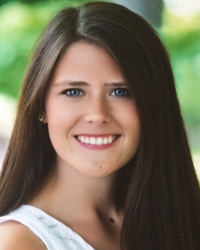
While Sophia was hospitalized in the fall of 2009 receiving a bone marrow transplant from her older brother as her donor, her grandmother brought her a homemade, colored pillowcase every day to lift her spirits. In 2012, Sophia co-founded the Sweet Dreams Project which brings homemade pillowcases and other comfort items to hospitalized children in Minnesota. The project has donated 354 pillowcases, 2,671 craft items, and 671 stuffed animals. For Sophia, the Sweet Dreams Project and her aspirations to become a pediatric
hematologist
hematologist:
(hee-muh-TOL-uh-jist) A doctor who specializes in treating blood diseases and disorders of blood producing organs.
are all about paying it forward. Diagnosed with aplastic anemia at age 12, the life-saving-transplant and care she received changed the direction of her life. “I was given a second chance, and I do not intend to waste it,” says Sophia.
In high school, Sophia has achieved a 4.0 GPA and is a member of the National Honor Society. She has been involved in a program that trains student community leaders and has been active in a peer mentoring program that prepares middle school children for high school. This fall, the Rogers, Minnesota native will start her freshman year at the University of Wisconsin-Madison majoring in biology and global health with the goal of getting into medical school. Her dream is to work at the University of Minnesota Masonic Children’s Hospital where she received her transplant.
In Her Own Words
My experiences with aplastic anemia have taught me a lot, both about myself and about the world around me. I believe one reason why I was able to thrive and carry on after my diagnosis was the positive attitude that my family and I kept. My mom, who stayed with me in the hospital, is an extremely positive person. She taught me to always stay hopeful about my situation and to look on the bright side. One doctor even told us that he wished he could “bottle our attitudes”. I believe that this positive outlook greatly contributed to my recovery and helped me back to health. As a result of my illness, I also learned something important about myself. This happened not in a hospital or clinic, but in an unlikely place -- Disney World. Because of my treatment, I was unable to go on the annual family vacation to Florida, so my mom, grandma, and I went later in the year. While waiting in line, we noticed a boy wearing a surgical mask, like I had often worn, standing in front of us. My mom had the urge to talk to him and his family, but she did not know why. Upon talking with them, we learned that the little boy also had aplastic anemia. His family had moved from South America to Boston for treatment. He did not have a sibling donor and was waiting for an unrelated donor to be matched with him. His family had been sent to Disney World while they waited for news of a match. I was able to talk to him and answer some of his questions. I learned that I enjoyed sharing my experiences if they could help others in similar situations. From that moment on, I knew that I wanted to devote my life to helping children facing serious illnesses. I now see how lucky I am to be here. I want to make sure that other children are given the same opportunity that I have been given to live their lives, reach their goals, and achieve their dreams.
Lydia Smith
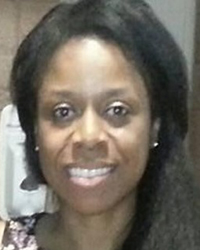
Lydia says that she never wants to stop learning and she misses being around people “who are just as thirsty for knowledge as I am.” That’s why this fall, the 24-year-old and two-time Debono scholar is leaving her job as an industrial engineer to go back to school at the University of California – Berkeley. The Pennsauken, New Jersey native is moving across the country to pursue her Master’s degree in Industrial Engineering and eventually her PhD. A 2013 graduate of Vanderbilt University with a degree in engineering science, Lydia was soon working as an industrial engineer for Burlington Coat Factory helping them streamline processes, increase efficiency and make labor costs more predictable. “Working as an industrial engineer for the past year and a half has not only affirmed my passion for the science, but has given me a mature work ethic that develops from interacting in the workplace,” says Lydia. Going back to school is just another step in her “drive for continuous self-improvement.”
In February 2011, during her sophomore year at Vanderbilt, Lydia had to withdraw from school due to her aplastic anemia diagnosis. She says she went through a difficult time physically and emotionally until she learned to accept her situation. She was treated with ATG (anti-thymocyte globulin) and
chemotherapy
chemotherapy:
(kee-moe-THER-uh-pee) The use of medicines that kill cells (cytotoxic agents). People with high-risk or intermediate-2 risk myelodysplastic syndrome (MDS) may be given chemotherapy to kill bone marrow cells that have an abnormal size, shape, or look. Chemotherapy hurts healthy cells along with…
and when she was allowed to return to school in the fall of 2011, she flourished. Lydia became a member of the Vanderbilt Planning Board planning campus events for the student body and local residents. She also joined a sorority which raised funds for the March of Dimes fighting infant mortality. Her grades improved and she graduated with a 3.2 GPA. A yoga enthusiast, one of the things Lydia learned from her disease and her hobby was the importance of a well-balanced lifestyle. When returning to school, she “worked with her college professors to create a reasonable schedule and began joining the activities that spoke most to me.” She also became more focused “zoning in on what she really wanted”, which today is improving her education.
In Her Own Words
What made the true difference was finally being able to submit. Being submissive can be a hard thing to swallow. Unfortunately, many people today look upon it as weakness. In movies, it’s never the hero who throws up their hands, and cries “I yield, I yield”, but a much weaker counterpart. A better word for submitting is accepting. Accepting that what has happened to you has happened, and that you must build from there. Once I accepted the fact that I was sick, I began to learn from my situation, and I began to grow. I stay well balanced by remembering that good health must always be a priority for me. I focus in on the fact that I have done a lot with my life and I have a lot more to do. To me, being able to submit signifies humility. When I submit, I’m saying, I know my own personal limits, but more importantly I know that with God my abilities are limitless. We conclude every yoga class by saying Namaste, which simply means, the divine in me bows down to the divine in you.
Cindy Tran
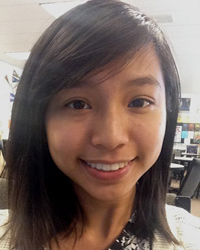
Cindy was diagnosed with severe aplastic anemia in November 2012 when she was 15 years old. Through the many tribulations with her disease, she never lost the “heart to give back” as she describes it. For four years, she has been treasurer of her high school’s Key Club, a student-led organization that teaches leadership through service to others. An “A” student, the 18 year-old from Garden Grove, California has had leadership roles with the National Honor Society, Future Business Leaders of America, and the Asian-Pacific Islander Club during her high school career. This fall, she will attend California State University at Long Beach as a freshman to start her pursuit of a degree in nutrition. She has a special interest in working with children in need.
When Cindy was diagnosed, her brother was found to be a perfect match for a bone marrow transplant. She was transferred to UCLA Mattel Children’s Hospital for the transplant, but a few weeks before it was to occur she suffered a hemorrhagic stroke that left her comatose. She could not move or speak. Cindy says she had a choice of giving up “all that I had in life”, but “I wanted to remain strong. I wanted to live again.” With determination, she learned how to write again and her arms gradually regained mobility. Two and a half months later, she did receive a bone marrow transplant. While she has not regained full use of her leg, Cindy says, “I have hope that I will be stronger physically and emotionally so that whenever life throws another snowball at me, I will use it to build a snowman.”
In Her Own Words
I remembered entering the second floor of Tu Du Obstetric Hospital explicitly hearing the cries echoing down the halls. I was only 13 years old when my family and I visited the impoverished Ho Chi Minh City of Vietnam to aid the orphans. I witnessed the conditions the children were in and their state of health was difficult to process. Every time my family and I paid a visit, I would spend my time with them playing, working, and donating much appreciated items like milk, snacks, and goodie bags to each child. There were coloring books and tools that I would use to work with them. Minh, who was only two-and-a-half at that time, was struggling to color using his deformed hands. As a young Chinese teenager, I wasn’t sure of what to do or how to help him because of my broken Vietnamese. However, I felt the most utmost compassion for him realizing that Minh was born with birth defects and abandoned when he was barely out of his mother’s womb. With this in mind, I broke away from my comfort zone and reached out for a crayon and began coloring with him. I was able to practice my Vietnamese with Minh and his smile was one that I will never forget. That summer, my family and I ended up paying a visit nearly every day to invest our time with the children before we returned home. From that day onward, this became one of the reasons why I set out a goal to become a nutritionist in order to aid these kids in need.
Dana Tripp
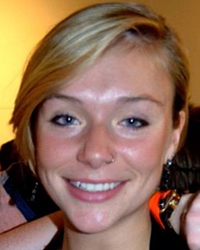
In April 2014, Dana had just received her fall acceptance to graduate school when suddenly everything had to be put on hold. With one month remaining in her senior year at Middlebury College in Vermont, she was diagnosed with aplastic anemia. She was able to graduate with a degree in Molecular Biology and Biochemistry, but struggled with fatigue and had to leave campus for
blood transfusions
blood transfusions:
A blood transfusion is a safe and common procedure. Most people who have a bone marrow failure disease like aplastic anemia, MDS or PNH will receive at least one blood transfusion. When you receive a blood transfusion, parts of blood from a donor are put into your bloodstream. This can help some…
at the local hospital while finishing up final projects and exams. Dana says “there was little finality to my undergraduate career.” Even so, she excelled, achieving a 3.68 undergraduate GPA. She was also senior tri-captain on the women’s track and field team earning a varsity letter and sang, acted, and danced in a musical, among a broad array of activities.
After receiving a bone marrow transplant from her brother at Brigham and Women’s Hospital in Boston last June, and taking a year to recover, the Saco, Maine native is now back pursuing her professional dreams. This fall, she will pursue her doctorate in veterinary medicine at the University of Wisconsin-Madison. Dana has always wanted to work in an agricultural environment and plans to practice large animal medicine. As a student at Middlebury, she conducted USDA-funded research and even milked cows six mornings per week for extra money. She is passionate about the role of veterinarians in the community and while recovering from her transplant during the past year, she joined her local Grange (an organization for farmers) performing community service and calling attention to bone marrow failure diseases and the need for increasing participation in the bone marrow registry. She plans to stay connected with the support community and hopes to organize a bone marrow or blood drive during her first year in veterinary school. This is her first Debono scholarship.
In Her Own Words
One of the best ways I’ve found to get a better handle on aplastic anemia and other diseases like it, is simply to share experiences candidly and accessibly, especially when people ask it of you. Few know what it is like to be a young person dealing with these kinds of hardships, and almost as few know how young people want to be treated or what kind of support they want. At the outset of my (as I perceived it then) trudge to the one-year finish line where I would inhabit a “normal” immune system, I got frustrated by those who said to me, “It’s only a year, Dana. That’s not long at all.” In the heart of a 22-year-old, a year is a lifetime. A span of time in which a thousand dramas, comedies, tragedies, and histories can be made and played. To those whose lives are put on hold at a point in your life when there is so much momentum and opportunity, know that it will wait for you. Things will not change while you turn to your body and spend time together. Things will not change, but you will, and you have the choice of how to incorporate those changes into your second life.
Caitlyn Ulinski
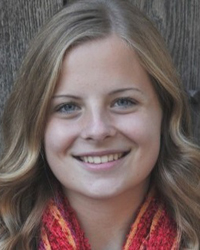
Caitlyn says that her best college experience so far has been organizing a bone marrow drive this March at Kettering University in Michigan where she is finishing her freshman year. The electrical engineering major says she and her friends from a fraternity worked with Be the Match (www.bethematch.org) to put together a drive on campus. She says she was “so touched and proud” to have 60 people join the registry. In college, Caitlyn has her hands in a bit of everything. She has joined clubs that have sparked her interest in manufacturing, engineering, plastic production, recycling, and community service. She recently joined the student government and is playing intramural soccer and volleyball. She is involved in all this activity while achieving a 3.8 GPA during her first semester. As an engineering student, she rotates between classes and co-op work every three months. She is currently gaining experience working on the plant floor at General Motors with other engineers.
Hailing from Bruce Township, Michigan, Caitlyn was diagnosed with severe aplastic anemia when she was a freshman in high school. The then 14-year-old received a bone marrow transplant from her sister in October 2010. After the transplant, she could not return to school because of her weakened immune system. She spent her days alone teaching herself classes like biology, Spanish II, and Algebra II. While she describes it as the “most difficult part of her life”, she was still able to graduate in the top 5% of her class and strengthened her body enough to play varsity soccer. Today her blood counts are normal and she feels healthy.
In Her Own Words
Determination, ambition, stubbornness, and love helped me live through my disease. When I set my mind to something, I accomplish it. I don't like to give up. Determination has helped me maintain good grades throughout my education, be a good worker at the jobs I've held, and play hard in soccer. This determination is part of the reason why I beat aplastic anemia, too. I persevered no matter how difficult my blood disorder became. Determination goes hand in hand with ambition. I set my goals high and I do what I have to in order to achieve them. When I was in the hospital, my ambitions were to make it out of there stronger than I was before. This ambition helped keep me alive, and it definitely did make me a stronger person. Usually being overly stubborn is a bad thing, but when I was in the hospital, it was helpful. I was too stubborn to give up, to let someone else or something else beat me. This is why I couldn't let aplastic anemia win the fight. The love of everyone around me and my love for them was really the main reason why I did not give up. I have so much love for my friends and especially my family. I kept going for them. There were times when I almost lost all hope; when I just felt so defeated and so tired of dealing with everything that I wanted to give up. But then I would think about everyone I care about and how supportive they all were. I loved them all so much and giving up would have hurt them badly. That was just not an option.


